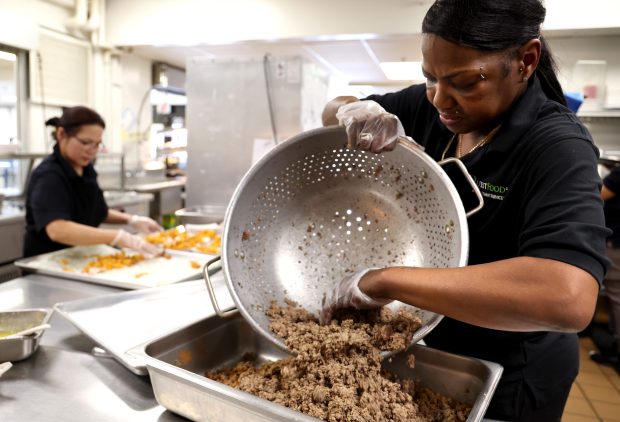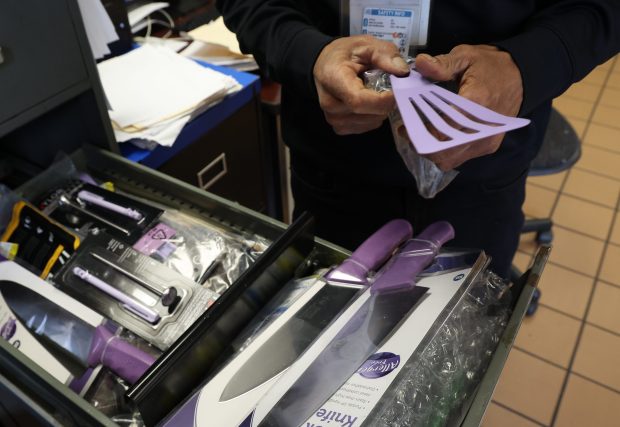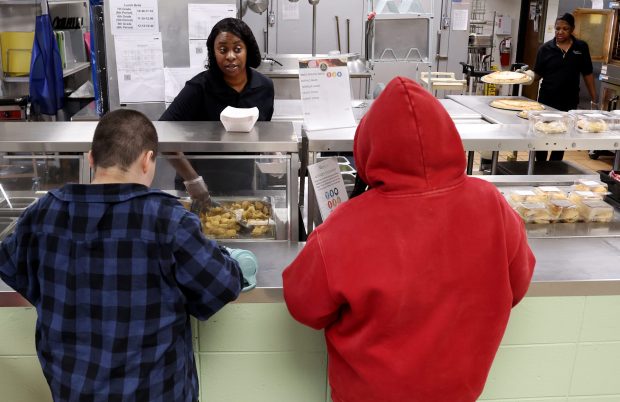Muslim students who eat halal usually only have a few options in the school cafeteria line once they’ve passed the hamburgers, chicken nuggets and deli sandwiches: a slice of cheese pizza, maybe a salad, fruit, yogurt, a carton of milk.
“Just not a lot of healthy, filling choices to pick from,” said Khadija Basith, whose children attend Forest Glen Elementary School in Glen Ellyn. “Even if there aren’t halal options, I want to at least see them offering a good veggie burger or a good fish wrap.”
Halal refers to food that is permissible according to Islam’s rules. Meats such as chicken and beef are halal depending on how the animal was treated, slaughtered and prepared. Pork, for instance, is never halal. Students who abide by halal rules tend to choose vegetarian meals or seafood to play it safe.
Basith’s is among the many Muslim families who, for decades, have had to be extra conscientious about what their kids are consuming at school, where the lack of oversight and accommodations for religious dietary requirements has been a long-standing issue.
However, an Illinois mandate, signed by Gov. J.B Pritzker on March 21, brings a sense of relief as it will soon require schools to provide halal options.
The Faith by Plate Act, also known as the Halal/Kosher bill, ensures that public schools and state-owned or state-operated facilities, such as prisons and hospitals that provide food services or cafeteria services, offer halal and kosher food options upon request, making Illinois the first state in the country to do so. The law gives schools and other state-run institutions 12 months to implement the necessary infrastructure to serve halal and kosher meals.
Initially drafted in 2023 and vetoed last year, the bill was revived with support from the Illinois State Board of Education. State Rep. Kevin John Olickal, now the primary House sponsor, said estimated costs for the program are $10 million to $20 million for the first year, depending on competition among vendors. Olickal said the mandate is subject to appropriation and will only go into effect if the state budget includes funding for the halal and kosher meals.
“I really hope it works out — I will definitely be buying into my children’s lunch program (at school) if I find it fits my guidelines, and if they really make it clear and are careful while checking all the boxes for halal guidelines,” Basith said.
Basith isn’t the only Muslim parent who is both ecstatic about the monumental law and treading slowly.
Shahana Khundmiri, a mom of three — two middle schoolers attending Hadley Junior High School and a high schooler at Glenbard West — said she often remembers her experiences attending public school and “watching others eat a variety of foods.”
As her children were growing up, Khundmiri would take the time to explain reasons why they choose halal, instead of simply forbidding them from eating pepperoni pizza at school.
“The older two were on board with why we shouldn’t be eating non-halal, but I think my youngest one kind of struggled with it (at school); she kind of felt left out,” Khundmiri said. “And I just talked to her about the importance of it and why we prefer halal meat — that it’s a better quality, it doesn’t have all the different hormones, the person slaughtering the animal has to make sure the animal feels comfortable. You don’t even sharpen the knife in front of them because there’s a hadith where it says, ‘You don’t want to kill the animal twice.’”
Khundmiri said that now, with the new law, many Muslim moms in her network are wondering if the proper process for halal meat will be met at such a high, state-wide volume. Khundmiri, like many others, is strict about meat being hand-slaughtered to ensure the proper halal guidelines found in the Quran and Hadith, which is the collection of practices and sayings of the Prophet Muhammad and constitutes a significant source of guidance for Muslims, are met.
Imran Qasim, who works with the Halal Food Standards Alliance of America, said the topic of hand versus machine slaughter is deeply contested and controversial in Muslim communities with varying opinions on each method.
Qasim said machine slaughter is common for standard poultry in the U.S. But it isn’t the preferred method of halal for several reasons, he added. Oftentimes, instead of a slaughterer reciting the name of God on every individual animal with proper intention, pre-recorded audio is played over the conveyor belt when chickens are machine slaughtered. Sometimes, the birds are gassed or stunned before being killed by a rotating blade, causing the animal more pain than necessary.
Qasim said HFSAA, one of many halal certification organizations in the U.S., only accepts hand-slaughtered poultry as its minimum certification standard. The method of hand-slaughter, Qasim explained, uses a sharp knife to sever the animal’s carotid arteries, resulting in a sudden, virtually painless death.

Maaria Mozaffar, director of advocacy and policy at the Illinois Muslim Civic Coalition, who drafted the Faith by Plate Act, said conversations about guidelines will happen before the funds are secured.
“The approach is — if you err on the side of the most conservative halal guidelines, it’s inclusive for everyone,” Mozaffar said. “The law also opens the door for other faith groups to advocate for their religious observances on food in state-funded institutions.”
Members of the Orthodox Jewish community follow a “very complex” process for keeping kosher, said Chicago-based Rabbi Shlomo Soroka, director of government affairs at Agudath Israel of Illinois, who worked with Mozaffar on the bill.
“Whenever it comes to having a sensitivity towards dietary restrictions that are faith-related, it’s important to the Jewish community that other faiths that may have dietary restrictions be accommodated and the Muslim community shares that sentiment,” Soroka said. “It’s only natural that we should be supporting each other.”
Amina Barhumi, advocacy and policy lead for the Muslim Civic Coalition, said rolling out the bill will be slow and steady. As a start, Barhumi said lawmakers and advocates will draw on the experience of institutions and agencies that have already implemented halal and kosher options before the law is passed, such as Chicago Public Schools, which has 14 schools that offer kosher meals and nine that offer halal.
Barhumi added that food service workers will also need to be trained on cross-contamination concerns, such as keeping knives and utensils between different food groups separate.
In Glen Ellyn School District 41, Eric DePorter, assistant superintendent for Finance, Facilities, and Operations, said the district will introduce what it calls “halal-friendly” options sometime in April through its food service provider, Quest. The move isn’t a result of the bill but rather a demand from the community, including Khundmiri, who frequently emailed DePorter about adding halal menu items.
DePorter said he’s fully aware of the questions raised by the term “halal-friendly,” especially as many parents in the district are hoping for halal-certified meals.
“That’s the one thing about this that we’re still kind of navigating,” DePorter said. “We’re going to come out with a halal-friendly option, and that’s based entirely on our physical space limitations of one kitchen. We will separate the preparation as best we can, but we can’t certify that there’s never going to be some cross-contact. That’s why we’re going with friendly and parents were super, super happy to have even the halal-friendly option.”

DePorter hopes the district will be able to do more as the state law is implemented. For now, he’s focused on providing parents and students with what they’ve asked for.
Khundmiri said she’s thrilled that the district followed through on parent requests, but she’ll wait before allowing her kids to choose the new lunch menu’s halal-friendly orange chicken.
“I’m really, really excited that our district will be providing halal foods and I’m so happy about the bill, but we’re just kind of waiting on the certification process for it all,” Khundmiri said.
Asma Ahad, director of halal market development at the Islamic Food and Nutrition Council of America, said the most crucial element to keep in mind as lawmakers, advocacy organizations and stakeholders execute the mandate is very simple: “Halal is not just a piece of meat.”
“Halal is a compliance program that needs verification, like any other program,” Ahad said. “We have to move to the next stage and do it the right way with oversight, guidelines and training. When they put this into practice, the state of Illinois needs to have those three things in place to be successful.”




